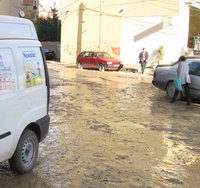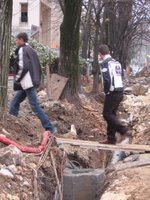Following a meeting with Edi Rama, Mayor of Tirana and Congress member, Congress President Giovanni Di Stasi on 16 December 2005 told the Congress Bureau of his “serious concerns regarding the deadlock between Tirana municipal council and central government about public works in the capital.”
“The Congress was first informed about this difficult situation a few weeks ago,” said Mr Di Stasi, “but we hoped that the deadlock would be overcome. Now it has to be said that this regrettable state of affairs is still continuing and is seriously upsetting the smooth operation of local self-government in Tirana.”
“We remain receptive to the calls made by the Mayor of Tirana, especially since the municipality has exhausted all domestic remedies for resolving the situation and the ombudsman’s conclusions have not been acted upon. That raises questions about our assessment of the positive development of local democracy in Albania and demands action by the Congress.”
The Congress Bureau has therefore decided to send a fact-finding team to Tirana to see whether the principles of the European Charter of Local Self-Government are being complied with in practice, especially as regards Article 8 which provides that supervision of local authorities should aim only at ensuring compliance with the law and exclude any supervision of the expediency of actions that fall within local authorities’ own areas of responsibility. Moreover, the principles of subsidiarity and proportionality remain key aspects of any administrative supervision by higher-level authorities.
The Congress stands ready to engage in dialogue with the Albanian authorities and hopes that a solution based on observance of the law and local authorities’ rights will be found to the current situation.
Given the state of Tirana's infrastructure serious delay in public works are disastrous – especially if the public works in question involve the “road” outside our house and the collapsing telegraph poles. These are now dragging on the ground and mean that I have to hold them out of the way in order to get our car under them. These are, of course, minor concerns compared to what the ordinary folk of the city face. Given that the government seems genuine in its desire to decentralise the running of the country, it seems surprising that in the biggest city with some of the greatest needs they are being obstructive.
 The key, though, is the mayor – Edi Rama (left). Rama is at once the most popular and the most disliked politician in the country – the comparison with Ken Livingstone in London comes to mind. Rama has transformed Tirana significantly since becoming mayor and has upset lots of people along the way. His popularity with many people here, and his fame overseas – he won the 2004 world mayor award – mean that he has made many political enemies.
The key, though, is the mayor – Edi Rama (left). Rama is at once the most popular and the most disliked politician in the country – the comparison with Ken Livingstone in London comes to mind. Rama has transformed Tirana significantly since becoming mayor and has upset lots of people along the way. His popularity with many people here, and his fame overseas – he won the 2004 world mayor award – mean that he has made many political enemies.
Rama is a member of the Socialist Party. In 2003, while the Socialists were in power and the Democratic Party were in opposition the Democrats attempted to establish a parliamentary commission to investigate public spending by the Tirana municipality under Rama. This was an attempt to undermine his prospects for re-election as mayor – a failed attempt since he was returned with 59% of the vote in 2004.
Now, however, following this years parliamentary elections it is the Democrats who are in power and the Socialists who are in opposition. The Socialists responded to their defeat by electing Rama as party chairman. Consequently, the ruling party has a certain interest in making life difficult for Rama in Tirana. Not only are they keen to undermine his role as mayor, they also want to undermine him as a prospective prime minister following the next parliamentary elections in 2009.

As if this were not enough, there is also considerable personal animosity between the mayor and the current prime minister, Sali Berisha (left). Rama has publicly accused Berisha of being behind a serious assault in 1997 that left him gravely injured. This at a time when Berisha was President of the country. Berisha, for his part, has described Rama as a pillar of corruption and a charlatan.
It is easy to shake your head and wonder at the grubby nature of Albanian politics. But the truth is that in Albania political skulduggery is there for all to see; in more sophisticated polities it is still there but better disguised – most of the time.
These are some of the challenges facing the municipality:




Comments